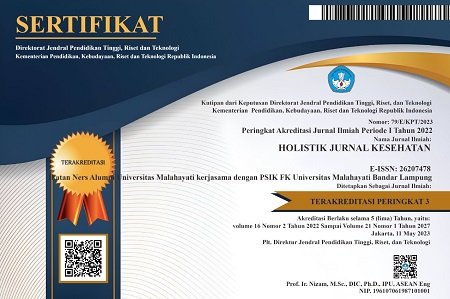Pengembangan volunteer palliative training module untuk mengoptimalkan perawatan paliatif berbasis komunitas di Indonesia
Abstract
Background: The number of cases of chronic diseases or non-communicable diseases (NCD) is increasing every year, both globally and locally. The trend of the biggest cause of death shifts from communicable diseases to NCDs. However, this increase has not been accompanied by a better understanding and awareness of the community about the importance of palliative care for patients with chronic and terminal illnesses, and how they can support the physical, psychosocial, and spiritual aspects in order to improve the quality of life of patients and their families.
Purpose: To produce a palliative volunteer training module to optimize community-based palliative care.
Method: Research and Development (R&D) with three phases of study. Phase I data collection and problem identification; phase II design and module development; and phase III evaluation. Participants in this study were the general public, namely health cadres and families of patients with chronic diseases as many as 90 people. The module was validated by material experts, also instructional design and language experts. Then, the field trial was undergone. The research was conducted in Tengah Tani District, Cirebon Regency, West Java.
Results: The validation results from material experts, instructional design, and linguistic experts stated that the modules that had been developed were rated very well. Nine training topics have been developed in three sessions. The results of the field trial show that the module is feasible to use (score 3.58 out of 4). Based on the comparison of pre-test and post-test results, the t-test measure resulted in 2.178 (> t-table 1.662) with a significance level of 0.05.
Conclusion: this module is effective for improving the learning outcomes of palliative trainees.
Suggestion: It is recommended that a wider-scale trial be conducted to assess the effectiveness of this module in larger regions of Indonesia.
Keywords: Developing; Volunteer; Palliative; Training; Module; Care; Community.
Pendahuluan: Meningkatnya jumlah kasus penyakit kronis atau Penyakit Tidak Menular (PTM) setiap tahun, baik di dunia maupun di Indonesia menunjukkan adanya pergeseran tren penyakit penyebab kematian terbesar, dari penyakit menular ke PTM. Namun, peningkatan ini belum dibarengi dengan pemahaman dan awareness masyarakat yang baik pula tentang pentingnya perawatan paliatif bagi pasien dengan penyakit kronis dan terminal, serta bagaimana dukungan fisik, psikososial, dan spiritual dapat diberikan di lingkup komunitas untuk meningkatkan kualitas hidup pasien dan keluarganya.
Tujuan: Menghasilkan modul pelatihan relawan paliatif untuk mengoptimalkan perawatan paliatif berbasis komunitas.
Metode: Research and Development (R&D) dengan tiga tahapan penelitian, yaitu tahap I pengumpulan data dan identifikasi masalah; tahap II desain dan pengembangan modul; dan tahap III evaluasi. Partisipan dalam penelitian adalah masyarakat awam yaitu kader-kader kesehatan dan keluarga pasien dengan penyakit kronis sebanyak 90 orang. Untuk melihat kelayakan modul, dilakukan validasi/ telaah dari ahli materi, ahli desain instruksional dan ahli Bahasa; dan uji coba lapangan field trials. Penelitian dilakukan di Kecamatan Tengah Tani, Kabupaten Cirebon, Jawa Barat.
Hasil: Hasil validasi dari ahli materi, ahli desain instruksional, dan ahli bahasa menyatakan bahwa modul yang telah dikembangkan dinilai sangat baik. Telah dikembangkan 9 topik pelatihan yang diberikan dalam tiga sesi. Hasil uji coba field trials menunjukkan bahwa modul layak digunakan (skor 3,58 dari 4). Berdasarkan perbandingan pre-test dan post-test, hasil t hitung diperoleh angka 2,178 (> t table 1,662) dengan taraf signifikansi 0,05.
Simpulan: Modul ini efektif untuk meningkatkan hasil belajar peserta pelatihan paliatif dalam lingkup komunitas.
Saran: Direkomendasikan agar dilakukan uji coba dalam skala yang lebih luas untuk menilai efektivitas dari modul ini di wilayah-wilayah lainnya di Indonesia.
Keywords
References
Agustini, N. L. P. I. B. (2022). Prinsip Etik Dalam Keperawatan Paliatif Dan Aspek Etik Legal. Keperawatan Paliatif (Konsep dan Penerapan), 109. Institute Teknologi dan Kesehatan Bali.
Badan Pusat Statistik Kabupaten Cirebon. (2021). Kecamatan Tengah Tani dalam Angka tahun 2021. Diakses dari: https://cirebonkab.bps.go.id/publication/2021/09/24/62cfa4ed5ad1557fdc3d8c57/kecamatan-tengah-tani-dalam-angka-2021.html.
Chow, K., & Dahlin, C. (2018, August). Integration of palliative care and oncology nursing. In Seminars in oncology nursing (Vol. 34, No. 3, pp. 192-201). WB Saunders.
Elsner, F., Schmidt, J., Rajagopal, M. R., Radbruch, L., & Pestinger, M. (2012). Psychosocial and spiritual problems of terminally ill patients in Kerala, India. Future Oncology, 8(9), 1183–1191. https://doi.org/10.2217/fon.12.97.
Giarti, A. T. (2018). Gambaran pengetahuan perawat tentang perawatan paliatif pada pasien kanker di RSUD DR. Moewardi. Skripsi. http://eprints.ums.ac.id/id/eprint/60054.
Hagan, T. L., Xu, J., Lopez, R. P., & Bressler, T. (2018). Nursing's role in leading palliative care: A call to action. Nurse education today, 61, 216-219. https://pubmed.ncbi.nlm.nih.gov/29245101/.
Kementerian Kesehatan Republik Indonesia. (2018). Laporan Nasional Riskesdas 2018. Kementrian Kesehatan Republik Indonesia. Lembaga Penerbit; Badan Penelitian dan Pengembangan Kesehatan. Diakses dari: http://repository.bkpk.kemkes.go.id/3514/1/Laporan%20Riskesdas%202018%20Nasional.pdf.
Mauruh, C. V., Malik, M. Z., Isnawati, I. A., Mahendra, D., Napolion, K., Plasay, M., Maria, D., Asrianto, A., Handayani, P. A., & Harun, B. (2022). Paliative Nursing. Konsep dan Perspektif Perawatan palliative. Rizmedia Pustaka Indonesia.
Muntamah, U., & Kp, S. (2020). Buku referensi untuk perawat “pedoman perawatan paliatif pada orang dengan HIV/AIDS (ODHA) di Rumah Sakit”.
Pallium India. (2020). Volunteer Training Program. https://palliumindia.org/volunteer-training-program.
Panggabean, D. M. (2022). Peran dan Fungsi Keluarga Dalam Perawatan Paliatif.
Rinawati, R. S. A. W. (2021). Asuhan Keperawatan Terminal.
Suprayitno, E., & Setiawan, I. (2021). Nurses’ roles in palliative care: An Islamic perspective. Belitung Nursing Journal, 7(1), 50-54.
Tampubolon, N. R., Fatimah, W. D., & Hidayati, A. U. N. (2021). Hambatan-Hambatan Implementasi Perawatan Paliatif di Indonesia: Systematic Review. Jurnal Kesehatan, 14(1), 1–10. https://doi.org/10.23917/jk.v14i1.12815.
Utama, H. P. (2018). Membangun Pendidikan Bermartabat. Rasibook.
Wen, F. H., Chen, J. S., Chou, W. C., Hsieh, C. H., Chang, W. C., Shen, W. C., & Tang, S. T. (2018). Quality of life and psychological distress are differentially associated with distinct symptom-functional states in terminally ill cancer patients’ last year of life. Journal of Psychooncology, 27(9), 2111–2118.
World Health Organization. (2016). Planning and Implementing palliative care services: a guide for programme managers. Diakses dari: https://apps.who.int/iris/handle/10665/250584.
World Health Organization. (2022a). Non-communicable Disease. https://www.who.int/news-room/fact-sheets/detail/noncommunicable-diseases.
World Health Organization. (2022b). WHOQOL: Measuring Quality of Life. https://www.who.int/tools/whoqol.
DOI: https://doi.org/10.33024/hjk.v16i7.8489
Refbacks
- There are currently no refbacks.
Copyright (c) 2022 Holistik Jurnal Kesehatan

This work is licensed under a Creative Commons Attribution-NonCommercial 4.0 International License.














